Mr. Hemakanth Selvarajah from Sri Lanka, Mr. Md Majadur Rahman from Bangladesh, and Mr. Nguyen Van Hoang from Vietnam, recently talked about his experience with the JICA-DSP course on disaster risk reduction.
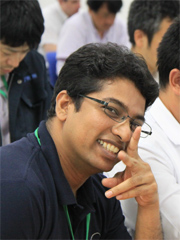
Name: Mr. Hemakanth Selvarajah
Country of Origin: Sri Lanka
Affiliation: Ministry of Irrigation and Water Resources Management
Education: International Centre for Water Hazard and Risk Management (ICHARM), Tsukuba and National Graduate Institute for Policy Studies (GRIPS), Tokyo.
JICA Course: Disaster Risk Reduction(DRR), Leaders Capacity Development for the Sendai Framework Implementation(JFY2018)
Hemakanth Selvarajah from Sri Lanka completed his Master’s in Engineering from the JDS program at Tokyo University. Now, back in Japan to participate in the JICA-DSP at GRIPS-Tokyo, he talks about his experience and learnings from the course.
Hemakanth is a civil engineer by profession, and back in Sri Lanka, he has worked at the Ministry of Irrigation and Water Resources Management.
When asked about what attracted him to Japan and JICA-DSP, he gets candid,
“I've been interested in Japan's technology since childhood. In fact, I’ve always wanted to visit Japan.”
Hemakanth further explained that because Japan is a global leader in disaster risk reduction, he wanted to explore the disaster risk reduction course at JICA.
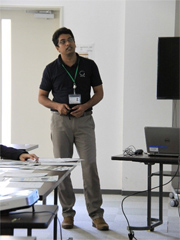
When asked about his motivation to apply to JICA-DSP, Hemakanth answered that he as a civil engineer, he understood the technical aspects of construction and management. But disaster risk reduction was a different ballgame altogether, and he wanted to learn more about it.
He opens about the challenges he faced while applying to the program, “When I was writing my research proposal, I had to learn the basics of disaster risk reduction.”
But he has since overcome his inhibitions, after coming to Japan. He says, “I’m extremely pleased with my experience here, as well as JICA’s excellent hospitality.”
Not just this, JICA even arranged a Covid vaccination programme for its students. Hemakanth says, pleased, “JICA has truly done more than enough to ensure the physical and mental well-being of its students.”
Hemakanth believes that his country doesn’t apply the cutting-edge technology and lacks the right kind of resources for disaster risk reduction. He says, “What’s sad is that we don’t learn from our past events, because of various reasons like poor data management and lack of research.”
He believes that Japan has been proactive in improving its capabilities for disaster risk reduction, which developing nations can learn and greatly benefit from.
The Sendai Framework for Disaster Risk Reduction (2015 -2030), for example, provides a structured approach to disaster risk reduction. Hemakanth expresses his views on the framework, “When we talk about efficient disaster risk reduction, Sendai Framework comes to mind. The approach can lead to substantial reduction of disaster losses, disaster losses to socioeconomic and environmental aspects. This is the kind of structured framework that we need across developing countries, including my home country.”
Hemakanth aims to close this gap in science and technology by applying his learnings from the JICA course to his country’s skills for disaster risk reduction.
He says, “I would really like to assess study disaster risk relationships and design adaptation strategies accordingly, such as dam operations to help with managing floods and droughts.”
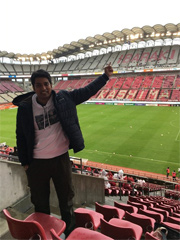
The past couple of years, Hemakanth has focused on studying the basics of climate change, seasonal forecasting, and short-term weather prediction. In the future, he looks forward to deepen his knowledge in these fields. He says, “I look forward to collaborating with experts in Japan and conducting research in order to advance the skills for disaster risk reduction in my country as well as in Japan.”
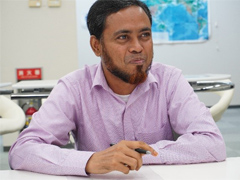
Name: Mr. Md Majadur Rahman
Country of Origin: Bangladesh
Affiliation: Bangladesh Water Development Board
Education: National Graduate Institute for Policy Studies (GRIPS), water-related Disaster management
JICA Course: Disaster Risk Reduction (DRR), Leaders Capacity Development for the Sendai Framework Implementation (JFY2020)
Md Majadur Rahman is currently taking the Disaster Risk Reduction course, conducted by JICA as part of the JICA-DSP. He recently opened up about how the course has helped him in various ways.
Rahman is originally from Bangladesh, where he worked for the Bangladesh Water Development Board, the largest organization in Bangladesh engaged in disaster risk reduction. He has been part of the disaster risk reduction course at National Graduate Institute for Policy Studies (conducted by JICA) since 2018. He talked about his motivation to pursue this course, “My profession requires me to stay updated on various disaster reduction strategies, and this course presented the perfect opportunity for that. Moreover, I’ve completed my Master’s from GRIPS, and my previous experience has been nothing short of great.”
So why was Rahman motivated to come back to Japan? He explains that Japan has a long history with disaster risk reduction, especially water disasters like floods and tsunamis, making it the place to be for professionals looking to gain more insight in this field.
He says, “My home country, Bangladesh, is also particularly vulnerable to water disasters. This course by JICA gave me a chance to apply learnings from how Japan has handled disasters of the past and apply it to my own country.”
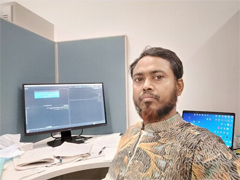
We asked Rahman how he coped with being away from his home country, especially in the current tough times. He says, poignantly, “I agree that it has been extremely tough being away from loved ones.” He adds, “I have to say that JICA has provided me with ample support, which helped make the transition smoother.”
So what were the most unique learnings of the disaster risk reduction course? Rahman explains that the course has been valuable to him, professionally. He says, “Unfortunately, floods are common in Bangladesh and lead to great damage and loss of lives. This course has helped me understand how proper planning and policymaking can help reduce the impact of water disasters in my country.”
Rahman also explains that he has learned a lot from the Sendai Framework for Disaster Risk Reduction (2015 -2030), which has helped him to enhance his professional knowledge and potentially improve resources for disaster risk reduction back in his country.
Raman’s ultimate goal is to influence policymaking related to disaster risk reduction in his country, and the disaster risk reduction course by JICA has given him a nudge in the right direction.
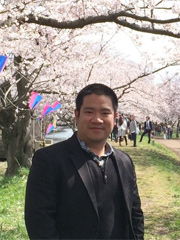
Name: Mr. Nguyen Van Hoang
Country of Origin: Vietnam
Affiliation: Disaster management Policy and Technology Center, Vietnam Disaster Management Authority
Education: National Graduate Institute for Policy Studies (GRIPS), Water-Related Disaster Management Course of Disaster Management Policy Program
JICA course: Disaster Risk Reduction (DRR), Leaders Capacity Development for the Sendai Framework Implementation (JFY2018)
Nguyen Van Hoang from Vietnam, recently talked about his experience with the JICA-DSP course on disaster risk reduction.
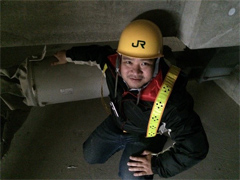
In Vietnam, Hoang worked at the Disaster management Policy and Technology Center, Vietnam Disaster Management Authority, in the field of water related disaster. Currently, he is taking the Disaster Management Program at GRIPS, as part of the JICA-DSP. So what was his motivation to apply for the disaster risk reduction program at JICA? Hoang explains, “Everyone knows how efficiently Japan has coped with natural disasters, especially water-related ones, in the past.”
That’s why he believes that Japan is in a good position to transfer the knowledge that it has gained to other developing countries that can meet a similar fate, in order to help them better prepare for it.
He says, “This course can help us to develop capacity to practically manage and mitigate the damage caused by flood disasters.” He explains that the course can help contribute towards the socioeconomic and environmental well-being, at both the regional and national level.
When asked about how his experience in Japan has been like so far, Hoang couldn’t stop gushing over his experience with JICA.
He says, “It’s always difficult to adapt to a new environment and culture. In Japan too, there’s so much to learn from. Its culture, in particular, is very interesting for me. JICA has truly helped me to adapt and focus on my course very quickly.”
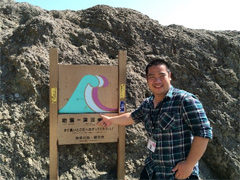
Hoang explains that the Sendai Framework talks about four priorities in disaster risk reduction: understanding disaster risk, strengthening disaster risk governance to manage disaster risk, investing in disaster reduction for resilience, and enhancing disaster preparedness for effective response. He says. “It’s a structured approach reduction of damage caused by disasters.”
So what were the most unique learnings of the disaster risk reduction course? According to Hoang, the course added a lot of value to his existing knowledge and skills related to disaster risk reduction. He says, “I would recommend the course to all my colleagues from the Disaster management Policy and Technology Center, Vietnam Disaster Management Authority, to broaden their views on disaster risk reduction, including floods.”
He adds that the course enhances cooperation and skills in disaster risk reduction and helps in building a strong foundation for disaster risk reduction.